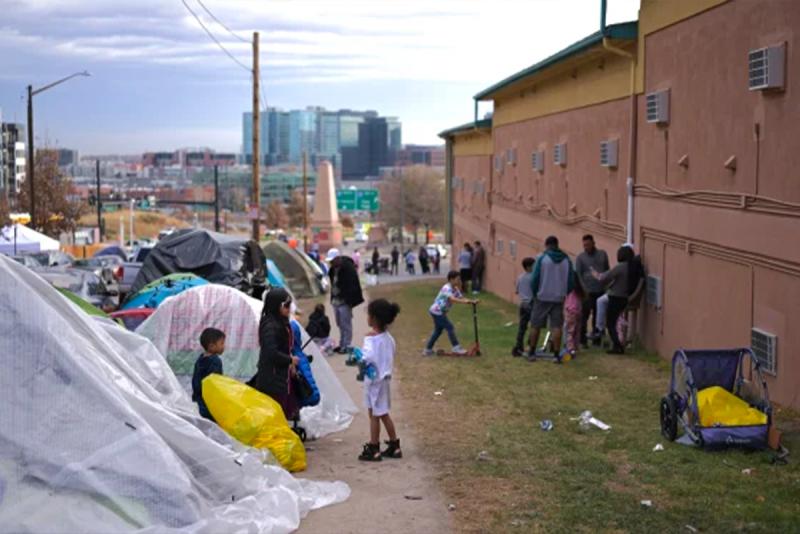Migrant Mutual Aid
An expansive mutual aid network has emerged to meet the needs of unhoused migrants in Denver

Children play between the campsite and Quality Inn Denver Downtown on Nov. 16. Hyoung Chang / Denver Post via Getty Images
University of Denver Graduate School of Social Work (GSSW) doctoral student Sierra Coye was on her front porch decompressing after class earlier this fall when a mother and her two young children walked by and in Spanish asked where the school was located. Coye decided to walk them to the nearby elementary school. Those steps turned out to be the first in a long journey walking beside a migrant family that had recently arrived in Denver.
The family — Alejandra and her children, ages 9 and 5 (names and other identifying information have been changed or omitted to protect the family’s privacy) — had left the shelter at 7:30 that morning and had been walking all day searching for the elementary school where they hoped to enroll. Just days before, they had arrived by bus from the southern U.S. border in Texas following a months-long journey on foot fleeing violence in their South American home country.
The kids were hungry, so Coye invited the family to join her for dinner. “That’s when I found out the shelter wasn’t providing [enough] food, they were in a room with 10 other people, they only had two sets of clothes each and no toiletries, and the 5-year-old’s shoes were falling off.” Coye called fellow doctoral student Olivia Hunte, MSW ’15. “I told her I need to activate mutual aid, now.”
“I thought we’d be able to figure out what was happening, we’d be able to activate mutual aid and we could pass them along to an organization that would help,” Coye says. “I was severely mistaken.”
That’s because government and nonprofit agencies in Denver and throughout Colorado have been swamped by the magnitude of the need. More than 32,000 migrants from Venezuela and other South or Central American nations have arrived in Denver from the U.S. southern border in the past year, bussed to Denver by the State of Texas and left — often in the middle of the night and without food, shelter or winter gear — on city streets. The City of Denver provides temporary stays in hotels, but once their shelter time is up, migrants are released to the streets, where hundreds have ended up in sprawling tent encampments.
Coye and Hunte mobilized their personal and professional networks to help, including other doctoral students and Associate Dean for Doctoral Education Jennifer Greenfield. Some people translated, others provided the clothing and supplies the family needed, and others shared information about processes and resources.
As they sought medical care, housing and to get Alejandra’s kids enrolled in school, “We called every single organization on Denver’s list of resources and were told they don’t work with that population because they require refugee or asylee status, or they didn’t answer or the number was wrong,” Coye recalls.
A month went by and the family still hadn’t made much progress in getting settled, despite having a group of dedicated social workers helping them. “If I as a social worker who is trained in navigating systems can’t make headway, people who are coming from another country and don’t speak the language can’t make headway,” Coye says. “There are not enough case managers in the world because the level of services and finances needed is so great.”
At a town hall hosted by the Denver mayor’s office and city council, Coye spoke up, warning that the city’s migrant crisis and housing crisis were about to converge, with potentially catastrophic consequences. No one seemed to hear her, she says.
“Politicians often fall short on delivering, and the people who need the support the most are the most left behind,” adds Hunte, who immigrated to the United States from Sainte Lucia at age 10. “It’s not that we don’t have the resources. We do. It’s who is deemed worthy and deserving of the resources. Caring for people should not be political, but unfortunately it is.”




